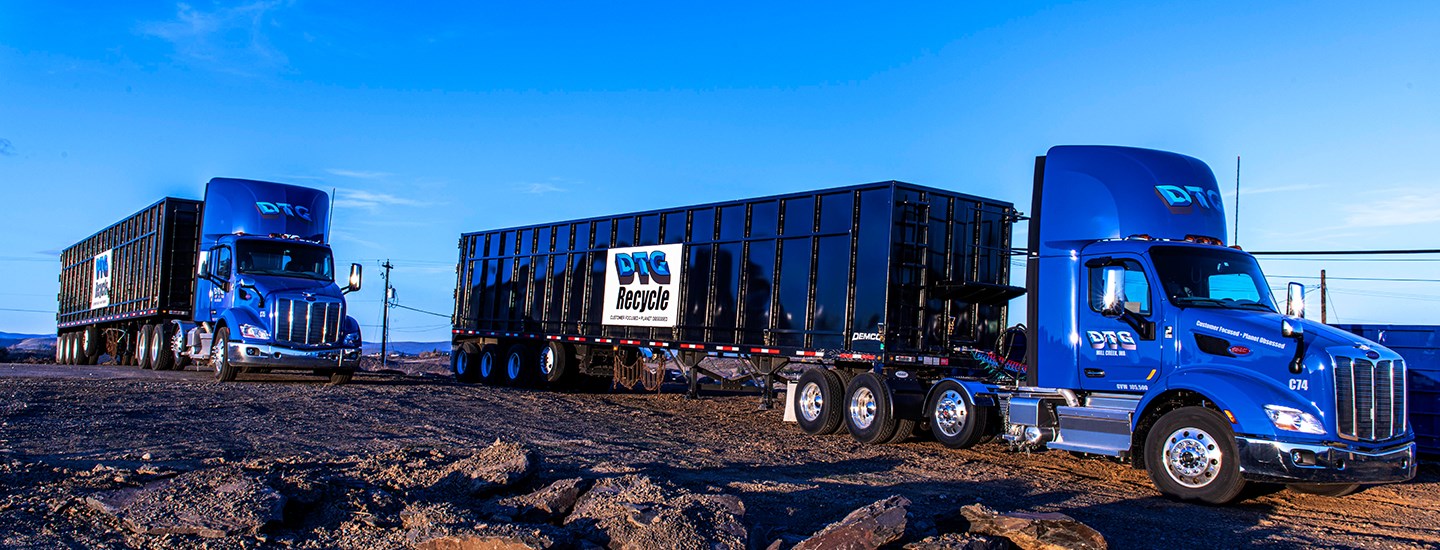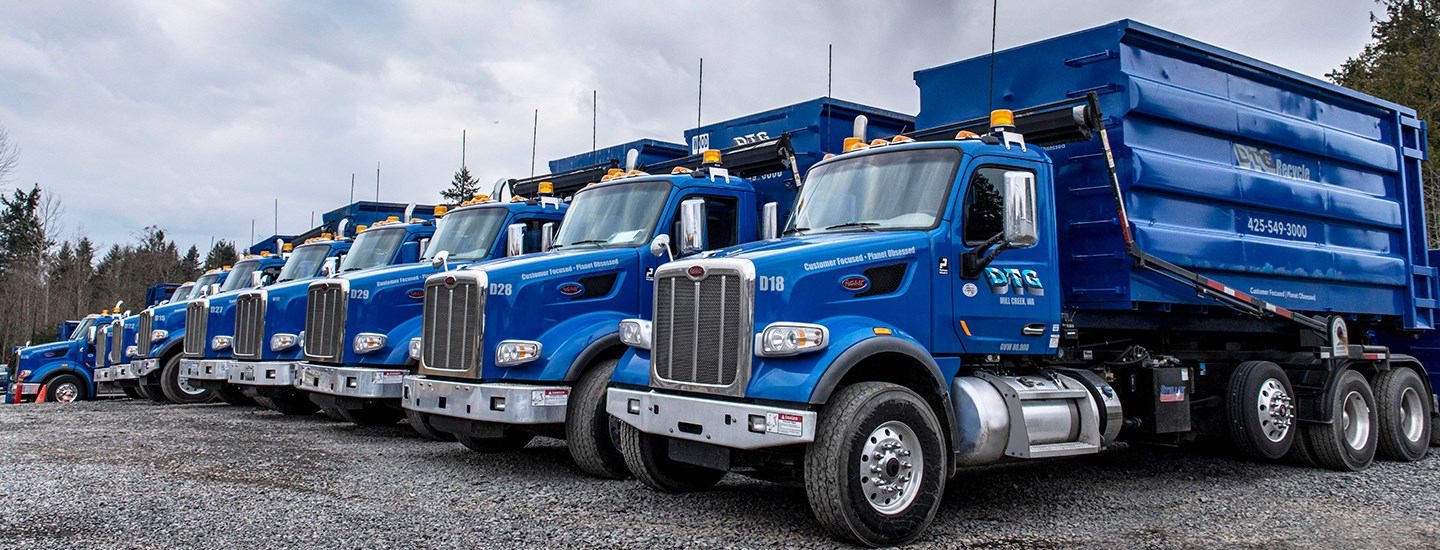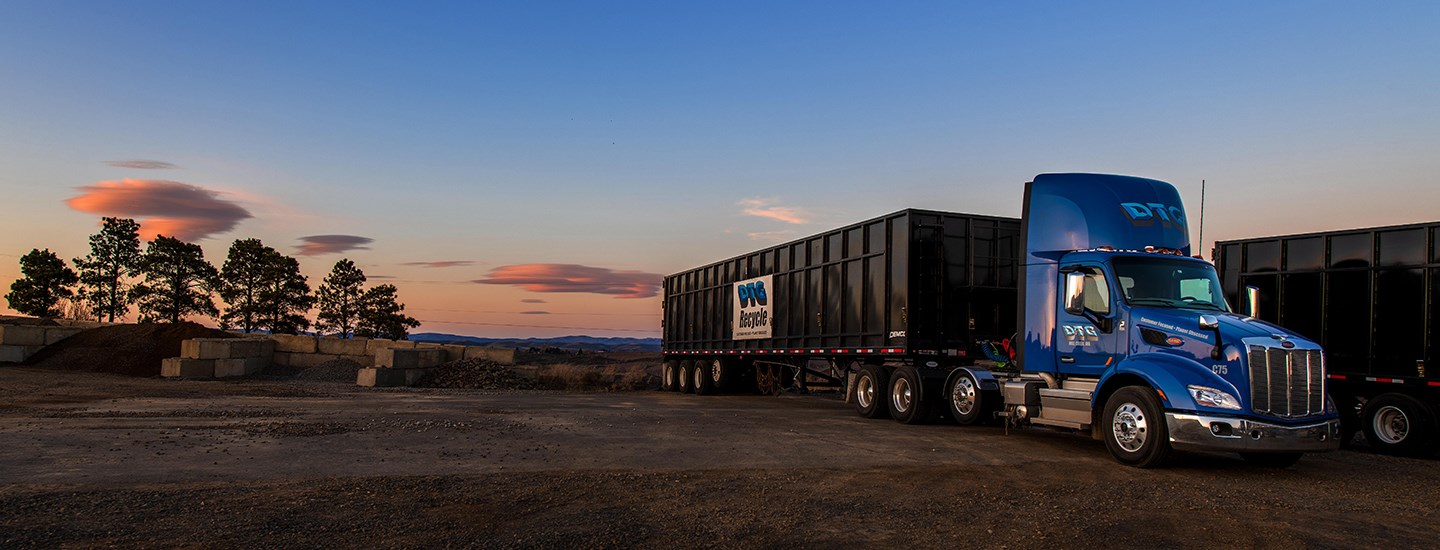DTG Recycle: Turning Debris into Useable Products with Peterbilts from PacLease
April 6, 2021

There is an old saying: “One man’s trash is another man’s treasure.”
For DTG Recycle, translated, that means one company’s scrap building materials, and another’s debris from building teardowns, means recycled goods and less waste in landfills.
“DTG has found success in helping customers with materials that are traditionally difficult to recycle,” said Ryan Jackman, director of marketing for Seattle area-based DTG Recycle. “We provide integrated recycling services for commercial, industrial, and construction clients by collecting and processing their waste, and turning the recovered materials into innovative products.”
In 2018, King County estimated that roughly 1/3 of the waste stream was made up of construction and demolition waste. “What we’re doing is reducing that number – we’re hauling away thousands of tons of material every day and are able to turn a majority of it back into products or alternative fuels. This way, everyone wins.”
DTG Recycle began as a small operation in 1999, but has grown exponentially nearly every year. Today it has nine locations consisting of material recovery facilities for sorting and processing inbound materials, a limited purpose landfill and petroleum contaminated soil treatment facility, and a rock quarry. In addition to building materials, it can recycle plastics, mattresses, carpet – even tires. And the company is at the forefront of creating recycled products. A grinding machine turns new construction drywall scraps into a high-quality gypsum fertilizer used in agriculture. That alone can produce more than 100 tons of fertilizer per day. They are also working with researchers at Washington State University to commercialize brick-like-blocks that are half the weight of a standard cinder block, yet they are fireproof and ten times more insulative. The plastic the company collects is sorted and utilized to make new plastic products or as an alternative fuel source in the production of cement. Recycled plastics are also used in DTG’s Planet Obsessed clothing line. Here, plastic, upcycled cotton, and polyethylene terephthalate come together to make hoodies and t-shirts.
To keep DTG moving and recycling, the company relies on a fleet of nearly 100 trucks, with the vast majority on a full-service lease from PacLease.

“We used to own our fleet of trucks – buying used and maintaining them ourselves,” recalled Jake Petty, service manager for DTG. “But with that came high maintenance costs and constant breakdowns. Plus, our mechanics had problems keeping up with the new technology that trucks were featuring. All of this was creating problems with scheduling. If we couldn’t make a pickup, that created a domino effect, and that not only hurt our reputation, it caused issues with our customers.”
That’s all changed thanks to an ultra-reliable fleet of Peterbilt trucks, maintained by dedicated PacLease technicians. “It’s a night and day difference,” said Petty. “Full-service leasing does several things for us. It conserves our cash flow, allowing us to continue to expand, and we get new equipment that is spec’d exactly the way we want it. The trucks are highly productive. And our bright blue Peterbilts showcase the quality that we bring to the table. Almost every day, we have a customer compliment us on our trucks.”
Unlike other leasing companies, PacLease provides vocational and specialized trucks. The DTG fleet includes Peterbilt Model 567s, outfitted with Stellar Hook Lifts. “We have more than 1,000 roll-off containers that our customers fill with recyclable material at residential or commercial job sites,” said Petty. “We have a pickup-and-delivery program that keeps recycling moving.”
The company also leases Model 567s with dump bodies and boom grapple hooks. Those are used to pick up 10 yard “swing cans” -- a small footprint contractor dumpster. Up to 50 yards of material can be packed into the truck’s dump body.
For its growing drywall recycling business, leased Peterbilt Model 220 cabovers are used. Those go to job sites with the sole mission of picking up drywall scrap – returning to the company’s material recovery facilities for sorting and processing. They also have two Peterbilt medium-duty conventionals on lease for use with a ‘big box’ chain, hauling away crates and packing material – in addition to mattresses, tires, and other items that can’t be resold.
In its tractor division, the company relies on PacLease for Model 579s to haul walking-floor trailers, end dumps, and gondola trailers. Lastly, it has Model 567s operating in a slip-seat six-day-a-week operation hauling side-dump trailers.

“We started leasing with PacLease about five years ago and now have more than 70 units with them,” said Petty. “On each new order, we go over specs to continually fine-tune our operation. It’s great to talk as a team with PacLease and truck engineers to see how we can improve our operation. Recently we changed the gear ratio in our tractors (spec’d with the PACCAR MX-13 engine, rated at 510 hp., and driven through the PACCAR 12-speed automated transmission). Those tractors head over Snoqualmie Pass to Yakima (Washington) – our newest location. This not only helps speed the trip over the pass, but we’re also getting better fuel economy.
“On some of our other trucks, we’ve bolstered the frame rails since we have such heavy loads and made the wheelbases just right to comply with bridge laws while better balancing the loads,” continued Petty.
Communication between DTG and PacLease is very streamlined, said Petty. “Each day, our drivers do a vehicle inspection report, so we know when to schedule a PM or have a truck come in for a repair,” said Petty. “If our dedicated PacLease technician and his mobile service unit need help, he can call in for another tech. And, if one of our tractors needs to be in the shop for an extended period, PacLease provides a loaner so we can keep our schedule going. In our business, the biggest ‘monster’ is that we have a set route. So uptime is critically important to us, and PacLease keeps us moving.”
The owner of DTG Recycle, Dan Guimont, has been a life-long fan of Peterbilt trucks; that enthusiasm has rubbed off on the company’s drivers. “They love these trucks,” said Petty with a smile. “They’re very comfortable and are the premium truck in the industry. Our drivers like coming to work to get behind the wheel of their Peterbilt. If anyone ever asks us about driver turnover, we say, ‘what’s that?’”
